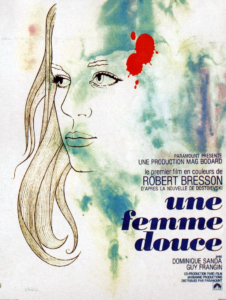Femme Douce, Une (1969)
“She made me see woman as an instrument of pleasure.”
|
Synopsis: |
|
Genres, Themes, Actors, and Directors:
Review: … and then is surprised when she’s not too pleased with his overbearing, objectifying approach to her. Maybe this is a common challenge for some men (“Why isn’t my wife happy? I give her everything she wants and needs…”) but it’s crystal clear that these individuals don’t actually relate to one another in any way except sexually. He’s penny-pinching, she’s inclined to generosity; he likes jazz, she likes classical music; she looks perpetually miserable, he looks perpetually suspicious and sour. What could go wrong? Well, as we know from the opening scene, pretty much everything, in the worst possible way. Of course it doesn’t help that Bresson has instructed his actors, as usual, to NOT act, rendering them essentially robotic from the get-go. Skip this one unless you’re a Bresson fan and somehow understand what he’s going for. Notable Performances, Qualities, and Moments: Must See? Links: |





One thought on “Femme Douce, Une (1969)”
First viewing (12/27/19). Only for Bresson completists. As posted in ‘Revival House of Camp & Cult’ (fb):
“We’re all built on the same model.”
‘Une femme douce’ (‘A Gentle Woman’): Robert Bresson made 14 films. Some of them are brilliant (‘L’argent’, ‘Pickpocket’, ‘A Man Escaped’). Some are… difficult. ‘UFD’ falls in-between.
Apparently rather faithful to the Dostoevsky short story it’s based on, it shows a man recounting to his maid everything that led up to his young wife’s suicide (the film’s opening scene, suggested). This is a film left to interpretation. Is the death the husband’s fault? Were they simply a bad match?
Watching Dominique Sanda (in her film debut), I was struck by how much she reminded me of Catherine Deneuve in ‘Repulsion’. The two characters share a kind of startling beauty, an inability to communicate well and a general disinterest in the world. Yet Sanda’s Elle fares slightly better. Unlike Deneuve’s Carol, Elle loves books and music and has a marginal interest in sex. But she also seems to think that humans are an abysmal disappointment (she calls the relatives she used to live with “sinister”, but are they?) and that each attempt at giving them a chance can only fail.
~which brings back the matter of how to interpret the film. Elle is not the “gentle creature” her husband thinks she is. But is what she’s experiencing clinical and undiagnosed? Or, as Bresson suggested, was she born into a world she finds alien; a world that has left her alone in a void?
The film was elegantly shot by Ghislain Cloquet – who was also DP for Polanski’s ‘Tess’ and who gave Woody Allen’s ‘Love and Death’ its tremendous sense of class.